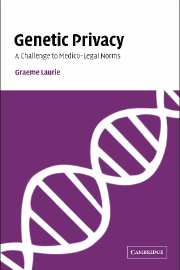Book contents
- Frontmatter
- Contents
- Preface
- Table of cases
- Table of legislation
- International instruments
- Miscellaneous documents
- 1 Health care, patient rights and privacy
- 2 Privacy: anti-social concept or fundamental right?
- 3 Human genetics and genetic privacy
- 4 Autonomy, confidentiality and privacy
- 5 Privacy and the public interest
- 6 Privacy and property?
- Index
3 - Human genetics and genetic privacy
Published online by Cambridge University Press: 25 June 2009
- Frontmatter
- Contents
- Preface
- Table of cases
- Table of legislation
- International instruments
- Miscellaneous documents
- 1 Health care, patient rights and privacy
- 2 Privacy: anti-social concept or fundamental right?
- 3 Human genetics and genetic privacy
- 4 Autonomy, confidentiality and privacy
- 5 Privacy and the public interest
- 6 Privacy and property?
- Index
Summary
Good ethics and good law
Good ethics and good law begin with good facts. This chapter therefore considers the current state of knowledge about human genetics and outlines the available options for its possible uses. The claims of persons and institutions with an interest in genetic information are examined and the potential conflicts explained. This is a crucial precursor to any discussion about the appropriate responses that ethics and law should have to any advances in genetic science and medicine.
The Human Genome Project
The idea of the Human Genome Project was endorsed by the US National Research Council in 1988, and an internationally coordinated effort was under way by late 1990 with the aim of mapping and sequencing the entire chain of human DNA: the human genome. A double helical string of DNA is contained in the nucleus of every cell in every human being, except the gametes. DNA dictates the nature and function of all such cells, and for this reason the human genome has been referred to as ‘the master blueprint of us all’. It is estimated that the work of the Human Genome Project will be completed by 2003. International coordination of the project is undertaken by the Human Genome Organisation (HUGO).
The project has proved to be a source of invaluable knowledge regarding the make-up, nature and function of the so-called ‘double helix of life’. The benefits that will accrue from this work are extensive.
- Type
- Chapter
- Information
- Genetic PrivacyA Challenge to Medico-Legal Norms, pp. 86 - 181Publisher: Cambridge University PressPrint publication year: 2002



